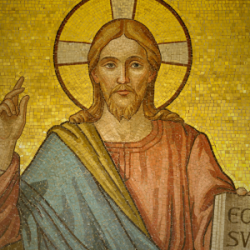
Our title this week is The Harmful Myth of Redemptive Death and our reading is from the gospel of John:
Now there were some Greeks among those who went up to worship at the festival. They came to Philip, who was from Bethsaida in Galilee, with a request. “Sir,” they said, “we would like to see Jesus.” Philip went to tell Andrew; Andrew and Philip in turn told Jesus.
Welcome Readers! Please subscribe to Social Jesus Here.
Jesus replied, “The hour has come for the Son of Man to be glorified. Very truly I tell you, unless a kernel of wheat falls to the ground and dies, it remains only a single seed. But if it dies, it produces many seeds. Anyone who loves their life will lose it, while anyone who hates their life in this world will keep it for eternal life. Whoever serves me must follow me; and where I am, my servant also will be. My Father will honor the one who serves me.
“Now my soul is troubled, and what shall I say? ‘Father, save me from this hour’? No, it was for this very reason I came to this hour. Father, glorify your name!”
Then a voice came from heaven, “I have glorified it, and will glorify it again.” The crowd that was there and heard it said it had thundered; others said an angel had spoken to him.
Jesus said, “This voice was for your benefit, not mine. Now is the time for judgment on this world; now the prince of this world will be driven out. And I, when I am lifted up from the earth, will draw all people to myself.” He said this to show the kind of death he was going to die. (John 12:20-33)
We continue in the gospel of John this week. Our passage, once again, has a problematic history of justifying death or abuse for those in disadvantaged or marginalized social locations or in predatory personal relationships. We must be careful and intentional not to perpetuate that harm (see God So Loved the World?). We’ll consider this further in a moment.
First, remember this is the last gospel to be written among those in our sacred canon. And it was written very late, almost a century removed from the events it writes about. This version of the Jesus story that was written by the Johannine community is radically different from the others as well. The few stories that it has in common with Mark, Matthew and Luke have different spins, different emphases, and different interpreted lessons (see Differences in John and Why They Matter).
In the other gospels, Jesus is executed by the state for speaking truth to power about the harm being done to the marginalized in his society. His protest culminates in his flipping the tables in the temple courtyard. In John’s gospel, this event has nothing to do with Jesus’ execution. Even the emphasis subtly changes. It’s no longer referred to with the overtones of a imperial execution for politically threatening the Pax Romana. Now its simply a “death” or “dying.” It’s referred to not as being crucified on a Roman cross, but, more opaquely, as being “lifted up.” The emphasis, unlike the synoptics, is not so much on the redemptive resurrection of Jesus as it is undoing, overturning, and reversing everything accomplished through Jesus’ crucifixion. The emphasis is on Jesus’ dying itself, and that death becomes redemptive.
In Mark, the Markan community was trying to make sense out of Jesus’ execution. In their telling, Jesus must be crucified and resurrected. In fact, the only reason Jesus is allowed to be crucified is so that he can be resurrected. By the time we get to John’s telling, though, Jesus must simply die. Everything is accomplished through the dying. The resurrection is simply a mysterious afterward but all redemptive accomplishment is done through his dying.
These are not insignificant theological difference between the gospels. These theologies have produced very different results in the lives of Jesus communities that emphasize one or the other. We’ll explore some of those differences, next.
(Read Part 2)
Are you getting all of RHM’s free resources each week?
Begin each day being inspired toward love, compassion, action, and justice. Free
Sign-Up at:
https://renewedheartministries.com/















